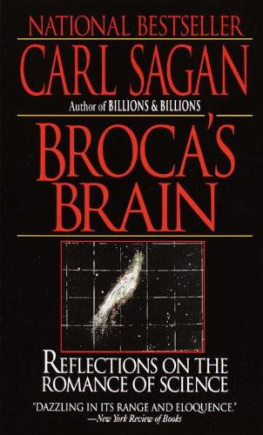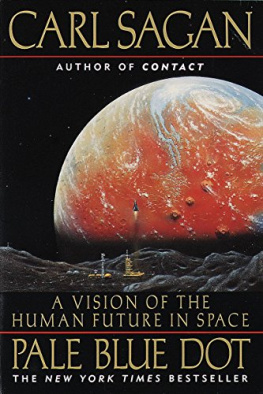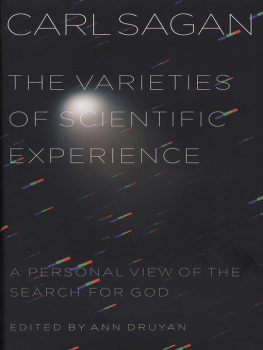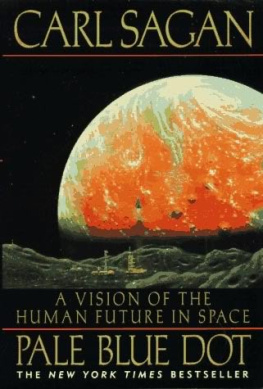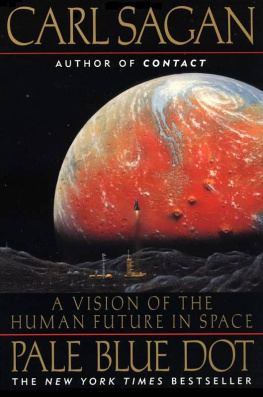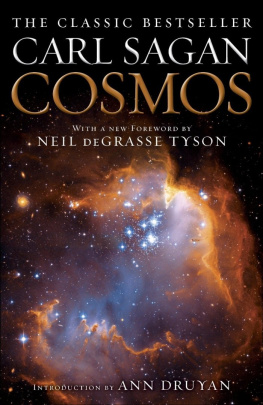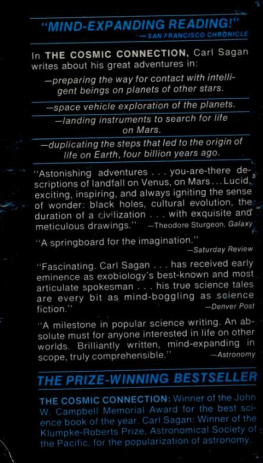9 KNOWLEDGE IS OUR DESTINY:
TERRESTRIAL AND EXTRATERRESTRIAL INTELLIGENCE
The silent hours steal on ...
WM. SHAKESPEARE King Richard III
The question of all questions for humanity, the problem which lies behind all others and is more interesting than any of them is that of the determination of man's place in Nature and his relation to the Cosmos. Whence our race came, what sorts of limits are set to our power over Nature and to Nature's power over us, to what goal we are striving, are the problems which present themselves afresh, with undiminished interest, to every human being born on earth. T. H. HUXLEY, 1863
AND so at last I return to one of the questions with which I started: the search for extraterrestrial intelligence. While the suggestion is sometimes made that the preferred channel of interstellar discourse will be telepathic, this seems to me at best a playful notion. At any rate, there is not the faintest evidence in support of it; and I have yet to see even moderately convincing evidence for telepathic transmission on this planet. We are not yet capable of significant interstellar space flight, although some other more advanced civilization might be. Despite all the talk of unidentified flying objects and ancient astronauts, there is no serious evidence that we have been or are being visited.
That, then, leaves machines. Communication with extraterrestrial intelligence may employ the electromagnetic spectrum, and most likely the radio part of the spectrum; or it might employ gravity waves, neutrinos, just conceivably tachyons (if they exist), or some new aspect of physics that will not be discovered for another three centuries. But whatever the channel, it will require machines to use, and if our experience in radioastronomy is any guide, computer-actuated machines with abilities approaching what we might call intelligence. To run through many days' worth of data on 1,008 different frequencies, where the information may vary every few seconds or faster, cannot be done well by visually scanning the records. It requires autocorrelation techniques and large electronic computers. And this situation, which applies to observations that Frank Drake of Cornell and I have recently performed at the Arecibo Observatory, can only become more complex-that is, more dependent on computers-with the listening devices likely to be employed in the near future. We can design receiving and transmitting programs of immense complexity. If we are lucky we will employ stratagems of great cleverness and elegance. But we cannot avoid utilizing the remarkable capabilities of machine intelligence if we wish to search for extraterrestrial intelligence.
The number of advanced civilizations in the Milky Way Galaxy today depends on many factors, ranging from the number of planets per star to the likelihood of the origin of life. But once life has started in a relatively benign environment and billions of years of evolutionary time are available, the expectation of many of us is that intelligent beings would develop. The
evolutionary path would, of course, be different from that taken on Earth. The precise sequence of events that have taken place here-including the extinction of the dinosaurs and the recession of the Pliocene and Pleistocene forests-have probably not occurred in precisely the same way anywhere else in the entire universe. But there should be many functionally equivalent pathways to a similar end result. The entire evolutionary record on our planet, particularly the record contained in fossil endocasts, illustrates a progressive tendency toward intelligence. There is nothing mysterious about this: smart organisms by and large survive better and leave more offspring than stupid ones. The details will certainly depend on circumstances, as, for example, if nonhuman primates with language have been exterminated by humans, while slightly less communicative apes were ignored by our ancestors. But the general trend seems quite clear and should apply to the evolution of intelligent life elsewhere. Once intelligent beings achieve technology and the capacity for self-destruction of their species, the selective advantage of intelligence becomes more uncertain .
And what if we receive a message? Is there any reason to think that the transmitting beings-evolved over billions of years of geological time in an environment vastly different from our own-would be sufficiently similar to us for their messages to be understood? I think the answer must be yes. A civilization transmitting radio messages must at least know about radio. The frequency, time constant, and bandpass of the message are common to transmitting and receiving civilizations. The situation may be a little like that of amateur or ham radio operators. Except for occasional
emergencies, their conversations seem almost exclusively concerned with the mechanics of their instruments: it is the one aspect of their lives they are certain to have in common.
But I think the situation is far more hopeful than this. We know that the laws of nature-or at least many of them-are the same everywhere. We can detect by spectroscopy the same chemical elements, the same common molecules on other planets, stars and galaxies; and the fact that the spectra are the same shows
that the same mechanisms by which atoms and molecules are induced to absorb and emit radiation exist everywhere. Distant galaxies can be observed moving ponderously about each other in precise accord with the same laws of gravitation that determine the motion of a tiny artificial satellite about our pale blue planet Earth. Gravity, quantum mechanics, and the great bulk of physics and chemistry are observed to be the same elsewhere as here.
Intelligent organisms evolving on another world may not be like us biochemically. They will almost certainly have evolved significantly different adaptations-from enzymes to organ systems-to deal with the different circumstances of their several worlds. But they must still come to grips with the same laws of nature.
The laws of falling bodies seem simple to us. At constant acceleration, as provided by Earth's gravity, the velocity of a falling object increases proportional to the time; the distance fallen proportional to the square of the time. These are very elementary relations. Since Galileo at least, they have been fairly generally grasped. Yet we can imagine a universe in which the laws of nature are immensely more complex. But we do not live in such a universe. Why not? I think it may be because all those organisms who perceived their universe as very complex are dead. Those of our arboreal ancestors who had difficulty computing their trajectories as they brachiated from tree to tree did not leave many offspring. Natural selection has served as a kind of intellectual sieve, producing brains and intelligences increasingly competent to deal with the laws of nature. This resonance, extracted by natural selection, between our brains and the universe may help explain a quandary set by Einstein: The most incomprehensible property of the universe, he said, is that it is so comprehensible.
If this is so, the same evolutionary winnowing must have occurred on other worlds that have evolved intelligent beings. Extraterrestrial intelligences that lack avian or arboreal ancestors may not share our passion for space flight. But all planetary atmospheres are relatively transparent in the visible and radio parts of the spectrum-because of the quantum mechanics of the cosmically most abundant atoms and molecules. Organisms throughout the universe should therefore be sensitive to optical and/or radio radiation, and, after the development of physics, the idea of electromagnetic radiation for interstellar communication should be a cosmic commonplace-a convergent idea evolving independently on countless worlds throughout the galaxy after the local discovery of elementary astronomy, what we might call the facts of life. If we are fortunate enough to make contact with some of those other beings, I think we will find that much of their biology, psychology, sociology and politics will seem to us stunningly exotic and deeply mysterious. But I suspect we will have little difficulty in understanding each other on the simpler aspects of astronomy, physics, chemistry and perhaps mathematics.
Next page



